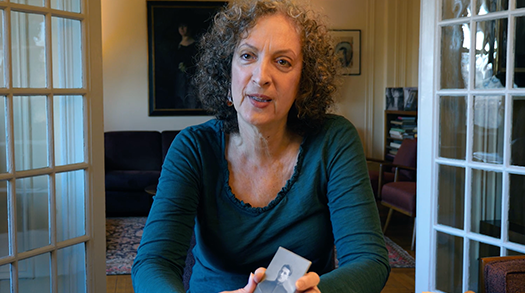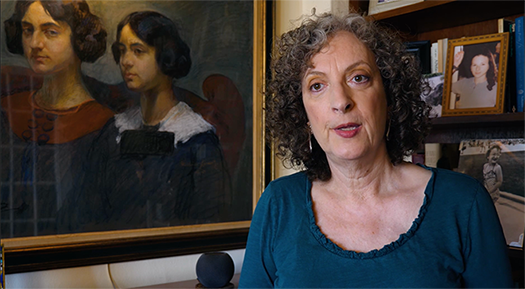Karen A. Frenkel 73F Delivers a Documentary Project on Her Family and the Holocaust

Hampshire College alum Karen A. Frenkel 73F produced Family Treasures Lost and Found, in which she is the reluctant star, telling the story of researching her family’s mysteries and their experience of surviving the Holocaust. It debuted at the Miami Jewish Film Festival in January.
For most of her career, Frenkel has been a tech and science journalist. Recently, she employed her research skills and her passion for learning to tell her family's story in this 75-minute documentary, as well as a companion memoir and a series of related 15-minute videos for teachers. We talked with her about her time at Hampshire, the process she undertook to uncover truths about her family, and what it took to put herself at the forefront of the story.
Did your experience at Hampshire influence the work you did afterward and are doing now?
My work at Hampshire deeply influenced the way I’ve approached science and technology reporting and writing. My Div III, about the philosophy of science and the philosophy of psychology, was in the back of my mind when I used analogies and other techniques to explain science and technology to my readers, and always considered their scientific or technical background. The emphasis at Hampshire on questioning the norm also influenced how I interviewed sources and the topics I chose to cover.
Tell us about the research for the film and related materials. After having written about others professionally, how did it feel to write and star in such a personal story?
I had done some investigative work while covering science and technology, and I yearned to do more. I used every skill at my disposal as a journalist and producer to investigate the past. Having covered technology, I had been “surfing the Web,” as we called online research back in the early 1980s.
In 2014, I started gathering information for Family Treasures part time. I followed leads using the tenacious, associative thinking journalists have always employed and used to call “shoe leather,” because reporters would tramp along in person from source to source. At first, I applied those techniques online, which in some ways is well suited for ferreting out facts because one answer or discovery leads to other questions and more discoveries. It’s very seductive in that you get instant gratification when information pops up. But you must maintain a skeptical eye regarding accuracy and always consider the source of information. And you have to slow down sometimes and formulate questions carefully.
I scoured the world’s newly digitized archives for two years. Because I don’t speak or read German and Polish, I corresponded with historians at the University of Vienna Medical School, my father's alma mater, and hired a Lviv genealogist and historian to search the Ukrainian State Archives. In 2016, I visited the cities where my family members had been most impacted — Vienna, Kraków, Tarnów, and Lviv — to check facts and get a sense of the neighborhoods where I had set scenes.
I also read several Jewish family histories, including works within an emerging subgenre of Holocaust memoir by descendants of Holocaust survivors, most of whom had survived concentration camps. I knew I had an extremely unusual story to tell because the experiences of most European Jewish refugees, including my father, remained untold. He neither spoke of his life in Lwów, now Lviv, Ukraine, nor his medical school days in Vienna, his flight from Poland in early 1939, or how he came here via Mexico. He died when I was 15, so I never had a chance to speak to him adult to adult.

My mother survived by posing as a Polish Catholic and volunteering to work as a slave laborer in Germany. Few Jews survived that ruse; most were discovered, denounced, and sent to the camps. In contrast to my father, my mother told my sisters and me about the war, and contributed her oral history to the Fortunoff Video Archive for Holocaust Testimonies. She also left college papers and her 1958 deposition when she sued the German government for deprivation of liberty.
In addition, we inherited family portraits and a huge collection of photographs from our great-grandparents, who fled Berlin in the fall of 1940 to Lisbon and from there to New York in early 1941 with steamer trunks full of their most precious belongings. The material depicts the lives of assimilated, urban Polish Jews in Kraków and Berlin. Very few Holocaust families have anything, and I wanted to share our artifacts with the world.
I told my husband, sisters, and friends about what I uncovered during my quest. Theirs and other feedback indicated that readers would want to know about my process, how I felt about what I’d learned, what it was like to be the child of Holocaust survivors, and so on. But as a reporter I’d been trained to remain in the background as much as possible and avoid editorializing.
So I took memoir classes to transition to that genre in which I would be a character and allowed — even expected — to conjecture and interpret events. The greatest challenge was to interweave my investigative quest with the emotional pull of the Holocaust stories so readers wouldn’t feel tugged from one thread to another.
Just as I was reluctant to write a memoir, I never thought I would appear in a film. My friend and colleague Marcia Rock, a professor at New York University’s Carter School of Journalism and a documentary filmmaker, listened raptly as I described my discoveries. I said I wanted to make a documentary based on what I was writing and showed her a rough cut that included images from my family’s collection. Besides the art, she loved listening to my voice and was confident I could narrate and appear in a film that we would make together. We collaborated for three and a half years, with her as director and me as producer.
In the last year, I brought in Roger Sherman 73S as consulting producer. I remembered him well from our days at Hampshire and admired his documentaries. His keen sense of pacing, suggested camera moves, and subtle fine tuning greatly enhanced the film. I’m grateful to Marcia and Roger and delighted with the result. The making of Family Treasures in itself has been a journey with its own arc.

What do you hope the film will achieve?
I didn’t set out to make a documentary to combat antisemitism, but Family Treasures certainly shows the consequences of exterminationist antisemitism and the long reach of the tentacles of persecution, war, trauma, and loss. Humans are not well equipped to fathom large numbers of victims, but can relate to individuals’ predicaments and decisions. Experiencing the details of one family’s plight in the face of the Nazi onslaught can engender audiences’ empathy. By extension, I hope they will look upon today’s 104 million displaced with compassion. Ultimately, I hope that will contribute to more tolerance and less conflict.
I’d like for Family Treasures to inspire viewers and readers to research their family histories while also learning about the Holocaust. Probing the past may yield unexpected healing feelings, like a greater sense of connection and solace, as it did for me. This emotional journey and fully venerating my relatives are, to me, the family treasures.
Any words of advice for future students of Hampshire?
I offer the advice my parents imparted to me: Follow your own star — that is, choose a discipline or profession that deeply interests you and about which you are passionate. The rewards will follow.
Frenkel’s first documentary, Minerva’s Machine: Women and Computing (1995), sought to explain why few women gravitated to computer science in academia and industry (and are still rare). Her second film, Net.LEARNING (1998), was about the pros and cons of online education. Both award-winning documentaries aired on Public Television.
Stills from Family Treasures courtesy of Karen A. Frenkel.



